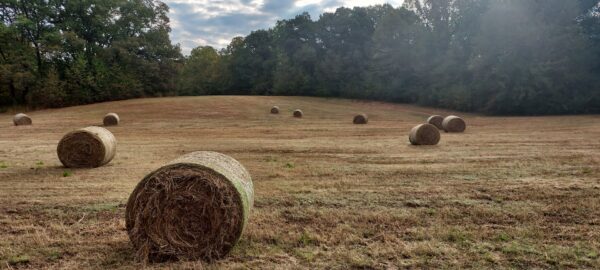
About the only thing we had going for us was that it wasn’t snowing, but that actually might have been better than what we faced. In fact, it was quite warm, for December, with steady wind. A lashing rain had just subsided ad now it just a few sprinkles. But the ground and about everything under this side of weather was soaked.
That’s one of the things that’s hard to really determine before you come to a place: the weather. You can research all you like about how much rain falls per year (Ripley receives about 53 inches of precipitation per year), but how it falls – when and how — is entirely different than the sum total. We lived in Oregon for a bit, taking note of the annual rainfall there compared to where we lived previously in Florida.
Here, during the wet winter months, the ground turns to grease. The top two or three inches of soil is slick and tar-like atop a thick, dense clay that can’t absorb the water. The result is that as waters accumulate – rain, melted snow – it soaks the top soil, but with nowhere to go, it pools and runs off to the lowest spot around. Brooks, springs and small streams flow everywhere. Flash floods are common because of it.
Stepping into the muck is obviously slippery. Depending on the boots you’re wearing, you may slide several inches or end up on your back side. The slush lasts from around the middle of November through March. I often joke that we need snowshoes to get through the muck. Nonetheless, getting around in swamp-like conditions for several months a year can be a challenging task.
Now, try pushing a 500-pound round bail about two hundred yards through the muck, in the rain. But we had hay to deliver and the tractor was down again. This time, the start was out. Before that, the radiator blew a hole; a flat tire; and the clutch. We thought about pushing the bail with the truck, but feared it would become bound up in the mud. So, we used our God-given leg, back and arm muscles.
Normally, moving a round bail is fairly simple. When it’s soaked through, add a couple extra hundred pounds of dead weight and you’re in for a workout. From the go, the work was arduous. About 50 yards in, my arms were weak and my legs on fire. A few quick breathers and we kept moving, cold, wet and burning.
As Kristina knows well, I struggle when things don’t go as planned. When overwhelmed, I can get whiny and short-tempered. I’m working on it through prayer, conversations with God and cool-down exercises. It was about this point that the switch in my head flipped to hot red and I began to sincerely question why we were doing this and if our exhausting work mattered.
In this case, our effort was vital. Two newly acquired starving horses (Faith and Grace) needed the meal and the calvary wasn’t coming to save the day. The required effort was on us.
Before I could begin to grumble, but after my mood soured, a still, small voice seemed to rattle my thoughts. A light hum escalated into thoughts that sounded like mine but not in my own voice:
“Scott, this has to be done. Yes, it’s uncomfortable, wet, the ground is sloppy and the load heavy, but it’s on you and Kristina to get this done. You know that. You’re here doing it and you know it’s important. The choice is yours how the work gets done, and how you will remember the way you responded to this adversity. Are you going to complain, whine, yell or scream, say something you’ll regret, or are you going to serve God (Me) through this work with a grateful and full heart, knowing you are changing lives? This is all temporary. The pain, the wet clothes, the grease-like ground. Days, months and years from now, you will remember this moment – Kristina will remember your leadership in this moment – will you be ashamed of yourself or proud? It’s your choice. You get to decide right now.”
I decided. I closed my mind to the anger and frustration that brewed. Looking at my beautiful, serving wife, I wanted nothing more than to impress her and the Lord with my work, no matter how tired I became or how many times I slipped and how much hay I wore.
What mattered is that the work got done, the starving ended and humility bubbling through me suppressed frustration that I have too often let take root.
What matters is how I serve, how I respond and how my actions are a reflection of Jesus in me.
